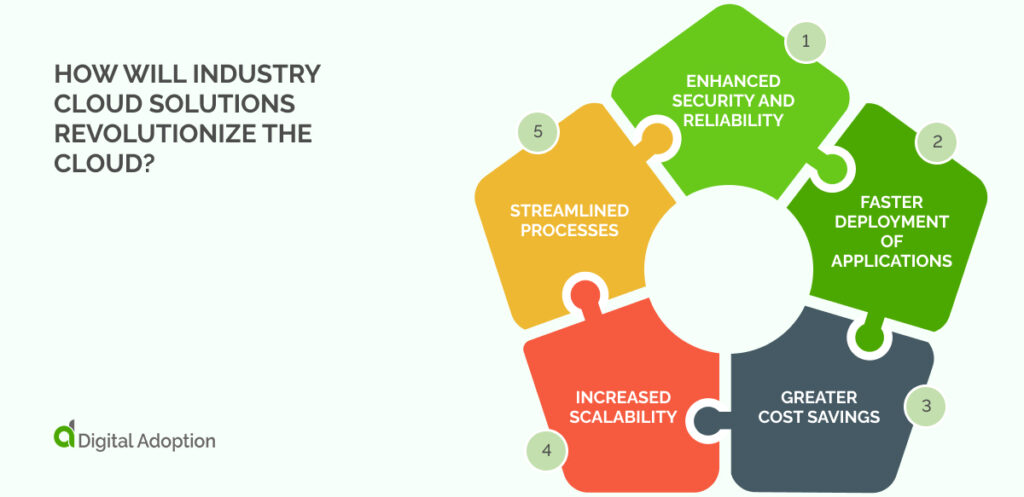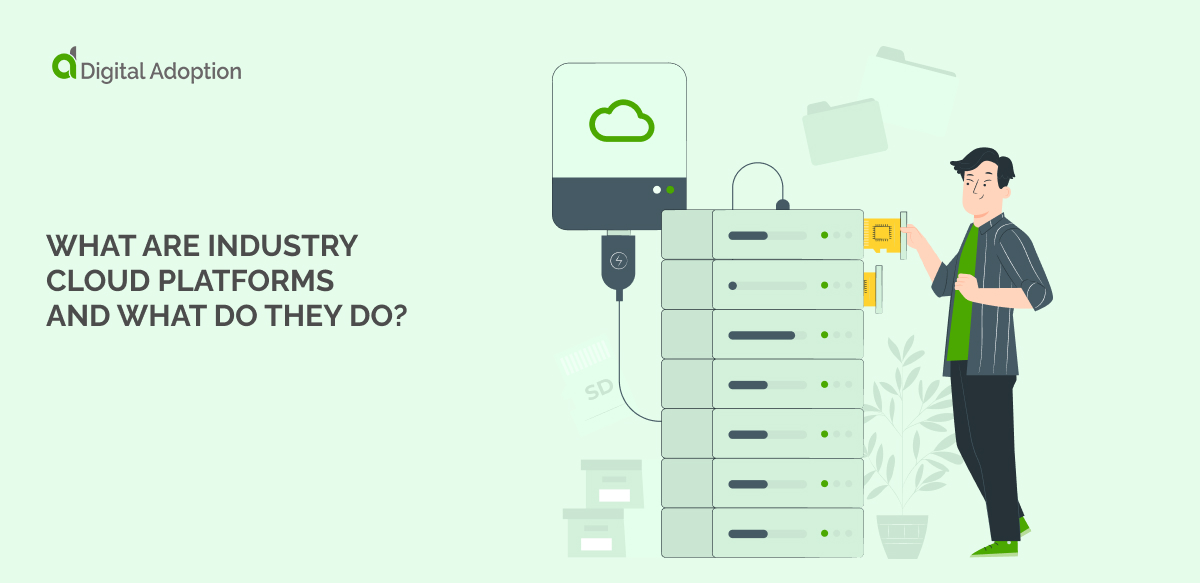As part of our Digital Adoption Trend Report, we are exploring the modern development of Industry Cloud Platforms, a suite of applications and services specifically tailored to the needs of distinct industries.
As a business leader, you always seek ways to gain a competitive edge.
Usually, that means differentiating yourself from competitors. It means focusing on the parts of your business that make you stand out.
But it’s hard to do that when keeping the wheels turning occupies all your time and effort. That’s where industry cloud platforms come in. Digital adoption and industry cloud solutions work hand in hand to help businesses leverage existing technology to streamline processes, improve the customer experience, and create value.
Industry clouds are an emerging technology that empowers you to focus on what makes your business shine by making day-to-day operations easier. Often seen as an essential element of digital transformation, industry clouds are cloud-based applications and services tailored to an industry’s needs.
According to Gartner’s Hype Cycle for Emerging Technology, industry clouds have yet to reach “the peak of inflated expectations.” If you’re familiar with the term “industry cloud platforms,” you’re already ahead of most of the industry.
But that won’t last long.
Gartner found that 70% of business consumers were considering the deployment of industry clouds by 2026.
If you want to stay ahead of the curve, you need to know:
- What are industry cloud platforms?
- How do they work?
- What are the benefits of industry clouds?
- What are the challenges of implementing them?
That’s what we’re going to cover in this article. We’ll also speculate a little on what could come next— after industry clouds have revolutionized business.
- What Are Industry Cloud Platforms?
- How Industry Cloud Platforms Work
- How Will Industry Cloud Solutions Revolutionize the Cloud?
- The Challenges of Industry Cloud Solutions
- What Are Cloud Providers Working On Next?
- Industry Cloud Platforms: Are They The Future of Enterprise, Or Is Our Head In The (Industry) Clouds?
What Are Industry Cloud Platforms?
Industry cloud platforms are just another type of cloud service. They differ from traditional cloud services because they’re optimized for the most common uses in a specific industry.
They’re a collection of relevant industry solutions where you can pick and choose what you want to use. They’re built to address specific industry processes.
When multiple companies focus on a particular business niche, they create what is known as a “vertical market” because their pool of potential customers is narrower but deeper.
This makes industry clouds a “vertical-specific B2B solution”. This is important because it highlights how vertical cloud platforms target groups of companies that are focused on a specific niche.
You could think of industry cloud platforms as the next stage in the cloud computing line of evolution.
First came Infrastructure-as-a-Service (Iaas). That evolved into Platform-as-a-Service (Paas).
And now, the evolution of cloud centric PaaS into industry cloud platforms has begun.
How Industry Cloud Platforms Work
If you’re still unsure what industry cloud platforms are, perhaps an explanation of how they work will help.
Businesses that share an industry most probably share some industry-specific functionality. They could all use an industry cloud to efficiently build process-driven solutions.
They can do this by using modular “building blocks” of packaged business capabilities, allowing them to combine components from multiple software providers for a customized solution that fits their needs.
That last part is important. With industry cloud platform technologies, customization is key.
You want to use a cloud platform to create an adaptive digital core for your critical business initiatives. You then want to customize the processes you layer on top of that core.
This way, you can create unique solutions that can be deployed immediately.
This approach allows you to spend fewer resources on the boring, essential stuff. Instead, you can focus on technical and business innovations. You can develop your competitive edge.
In this way, industry clouds are a powerful digital innovation tool.
How Will Industry Cloud Solutions Revolutionize the Cloud?

We know by now what benefits cloud computing has for businesses, so we’ll skip listing those and focus on the advantages industry cloud platforms add over other cloud technologies.
Enhanced Security and Reliability
Industry cloud platforms put security first. They provide a secure, private environment for your data and applications without investing in costly infrastructure.
Plus, they can help you comply with Industry regulations quickly— helping to reduce your risk of non-compliance penalties.
Faster deployment of applications
These innovative supporting technologies make it easy to deploy applications quickly and efficiently. This is because the core functions and processes are easy to set into place, thanks to the “building blocks” approach.
With the right platform, you can tailor your solution exactly how you want it for a fraction of the normal time, making business innovations easier and faster.
Greater cost savings
Businesses can significantly reduce operational costs using industry-specific cloud platforms instead of multiple independent software vendors.
Industry cloud platforms also provide access to economies of scale, which allows them to benefit from lower prices and higher efficiency when compared to working in isolation.
Increased scalability
As companies grow and their needs change, industry cloud platforms add an easy way to increase their business capabilities.
Industry cloud infrastructure is designed with scalability in mind, allowing companies to quickly ramp up their industry-relevant capabilities.
Streamlined processes
Industry cloud platforms streamline processes and make them more efficient by giving a business quick and easy access to artificial intelligence (AI), machine learning (ML), and robotic process automation (RPA) tools.
Businesses can work more quickly and accurately by reducing manual work and enabling automation.
The Challenges of Industry Cloud Solutions

The challenges faced by businesses looking to implement industry cloud solutions are no different than the challenges of implementing any emerging technology.
Integration difficulties, lack of industry standards, higher costs before “economies of scale” benefits begin, and lack of proven value in use cases—nothing you wouldn’t expect.
One challenge businesses will face when exploring industry cloud platforms is that the processes they enable will be average. Run-of-the-mill.
By simply adopting the whole industry cloud platform, you run the risk of replacing in-house processes that weren’t broken, to begin with, and your business might end up worse off for it.
It’s important to assess your current processes. If your ability to execute a business process exceeds the capability provided by an industry cloud platform— keep the process in-house.
The biggest challenge in developing industry cloud platforms is toeing the line between “not specific enough” and “too specific.”
By having too many hyper-specific platforms, cloud service providers will overwhelm themselves and find it harder to innovate— which means fewer new updates for your business.
What Are Cloud Providers Working On Next?
Industry cloud platforms are becoming the ultimate tool for businesses that want to innovate and grow quickly.
They offer a great balance between customization, cost savings, scalability, and security— making them an ideal choice for digital-first companies.
But just because they’re an emerging technology doesn’t mean we can’t theorize about the future.
The next stage in the cloud platform evolution line is “industry cloud ecosystems,” AKA “ecosystem clouds.”
Cloud service providers recognize that different vertical industries can share certain processes and challenges.
Healthcare companies and insurance providers aren’t in the same industry but are in the same ecosystem.
Industry cloud ecosystems could enable enterprises to engage in cross-industry innovations.
This will open up new business possibilities and provide even greater opportunities for innovation and growth.
Industry Cloud Platforms: Are They The Future of Enterprise, Or Is Our Head In The (Industry) Clouds?
The future of industry cloud platforms is collaboration, efficiency, and cost savings.
Companies across industries will benefit from the power of industry clouds— creating unique, customized solutions tailored to their exact needs and driving business transformation.
The philosophy of industry cloud platforms is this:
There are large chunks of business processes that are going to be the same for you as they are for your competitors. You should use industry cloud platforms to automate and outsource those processes.
There are other parts of your business that aren’t the same for you as they are for your competitors. These parts make you stand out and give you a competitive edge. Keep those parts in-house.
Follow that philosophy, and you’ll be flying high in no time.

 FACT CHECKED
FACT CHECKED







